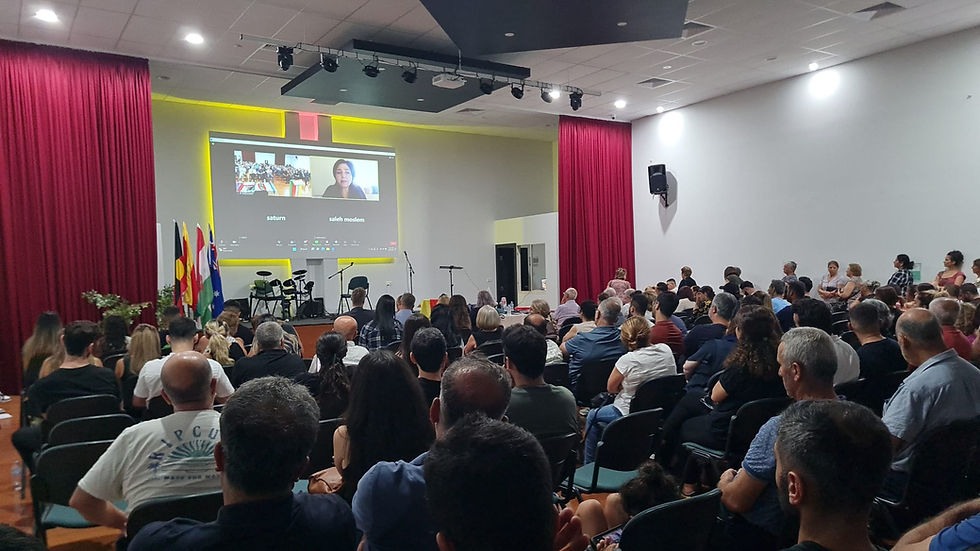Iran Meeting with Foreign Minister, Attorney-General, facilitated by Amnesty International
- Federation Democratic Kurdish Society - Australia
- Feb 19, 2023
- 4 min read


On 15/02/2023, The Federation was invited to speak in a meeting at Parliament House with the Honourable Penny Wong and the Honourable Mark Dreyfus KC MP, and the Honourable Peter Khalil MP. This meeting was facilitated by Amnesty International and included representatives of other Iranian diaspora groups. At this meeting, Zerebar Karimi (representing the Federation of Democratic Kurdish Society - Australia) highlighted what has often been left out: that the violence being carried out by the forces of the Iranian regime is disproportionately and viciously targeting its Kurdish regions, as well as other minoritised communities such as the Baloch.
Repressive state violence in Iran is, since the beginning of the protests, is taking its most extreme and deadly form in the Kurdish areas in the country’s west. This is also one of Iran's most impoverished and economically underdeveloped region, due to ongoing racist policies, intended to force assimilation. The assault on Kurdish communities is qualitatively more severe than what is occurring elsewhere, and will have a longer term impact overall. Nowhere else in Iran have we seen anything approaching the scale, or the barbarity, of the regime’s assaults on the people of the Kurdish and Baloch regions. It was the death of the young Kurdish woman, Jina, whose funeral sparked the first protest in her hometown of Saqqez. It was 'Jin Jiyan Azadi' that has been echoed and chanted throughout the Iran and indeed the world, since those first protests that spread through Kurdistan. 'Woman Life Freedom', far from being a mere slogan, belongs to a comprehensive ideology and political system, which has its roots in the Kurdish womens movement of over 40 years ago, and forms the foundation for the Womens Protection Units (YPG) who were instrumental in defeating ISIS.
Zerebar summarised the situation in Kurdish cities, where military personnel and armoured vehicles entered numerous numerous cities. Security personnel were deployed on the ground, gunning down protesters and civillians on the streets. A state of siege, so-called ‘martial law’, has been in effect in many cities, despite continued, heroic, resistance from the population. In Kurdish and Baloch towns, automatic weapons have routinely been used against civilians, whether they are protesting or not. In Balochistan, over 80 civillians were killed in one day, etched in our memories now as Black Friday. The Abduction of corpses from the streets and from hospitals was intended to prevent funerals from serving as gatherings where mourners and communities renewed and galvanise their resistance. The arrest and torture and abduction rates of Kurdish and Baluch community members are disproportionately much larger than their other Iranian counterparts, and this is a fact confirmed by Amnesty International’s own, independent research.
Still, at great risk to life and limb, thousands continue to throng to funerals, walking many kilometres across militarised terrain in order to attend. Tens of thousands of people of all ages continue to resist the Islamic Regime’s brutal reign across Kurdistan. The meeting also heard that Iran’s brutality against the Kurds did not stop at the border: the Regime also fired suicide missiles across the Iraqi border, killing and wounding dozens of exiled ex-Iranian Kurdish activists, their families, destroying the camps’ local school and their medical infrastructure. The youngest victim was a newborn child, who survived for 24 hours, but whose young mother perished.
The meeting members confirmed that this was the first of an ongoing forum of key DFAT and Government officials and Diaspora representatives to share information and look to resolutions. At this meeting, we asked that the Australian Government:
Recognises the particularly brutal and militarised nature of the targeting of Kurdish and Baluch communities in Iran;
Advocates for the representation and self determination of historically marginalised groups such as the Kurds, the Baloch, the Azeris (acknowledging that these minority communities together make up nearly 50% of Iran's total population);
Supports the demands of all ethnic and religious populations within Iran to peacefully coexist, for which self determination and political representation is a critical prerequisite.
Urges the Iranian authorities to immediately quash all convictions and death sentences stemming from the protests;
Urges the Iranian authorities to refrain from seeking further death sentences, and ensure that anyone charged with a recognisable criminal offence is tried in proceedings meeting international fair trial standards without recourse to the death penalty;
Urges the Iranian authorities to release anyone detained for peacefully exercising their human rights;
Urges the Iranian authorities to provide detainees access to their families and lawyers of their own choosing, protect them from torture and other ill-treatment and investigate torture allegations, bringing anyone found responsible to justice in fair trials;
Urges the Iranian authorities to grant independent observers access to capital trials connected to protests;
Urges the Iranian authorities to immediately establish an official moratorium on executions with a view of abolishing the death penalty.
We thank the Honourable Penny Wong and the Honourable Mark Dreyfus, The Honourable Peter Khalil, and all DFAT and other government officials present at this meeting for genuinely listening to and considering our message. We cannot overstate our gratitude to Amnesty International for their facilitation and coordination of this meeting, and for recognising the crucial need to have Kurdish and other minoritised voices at the table.



